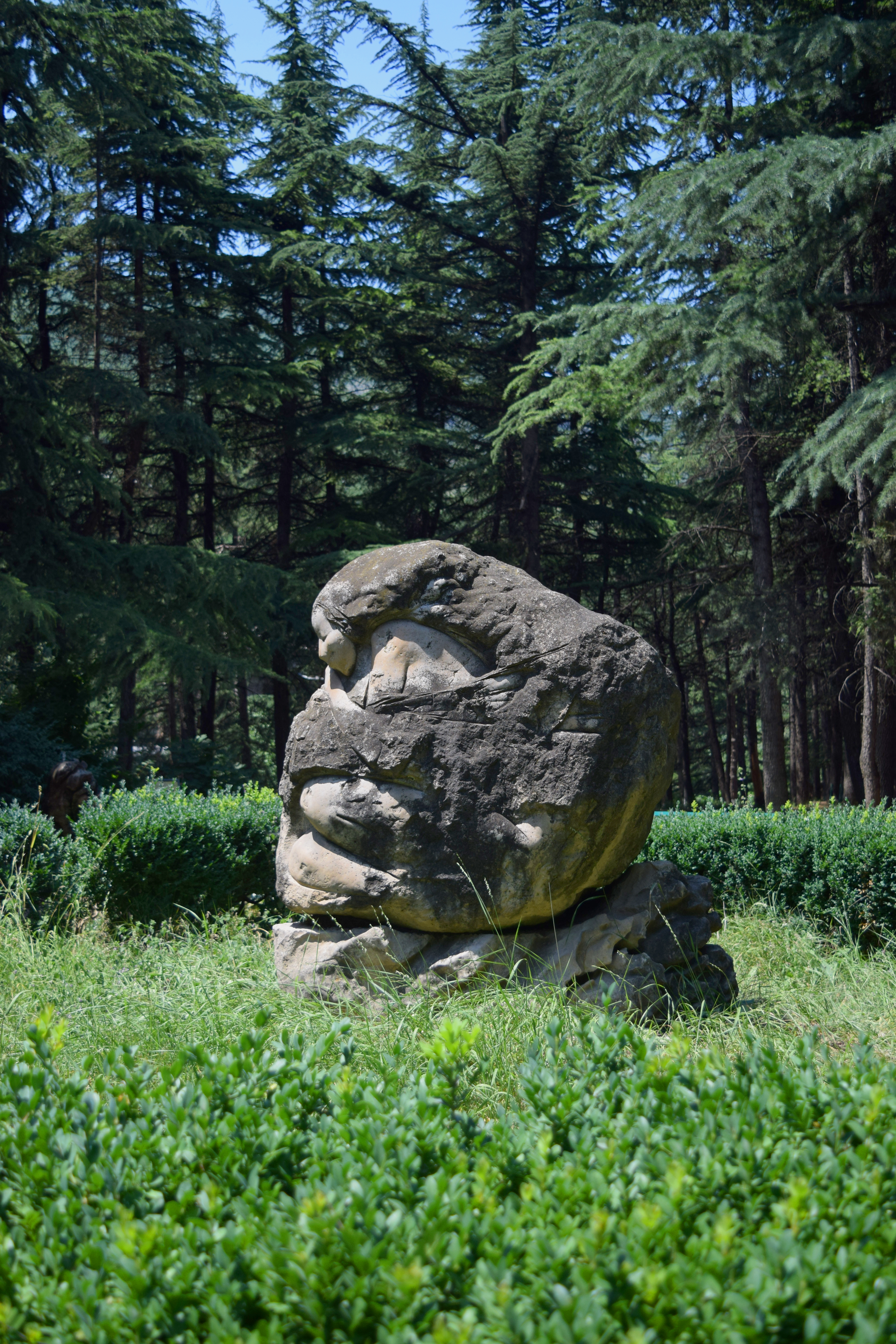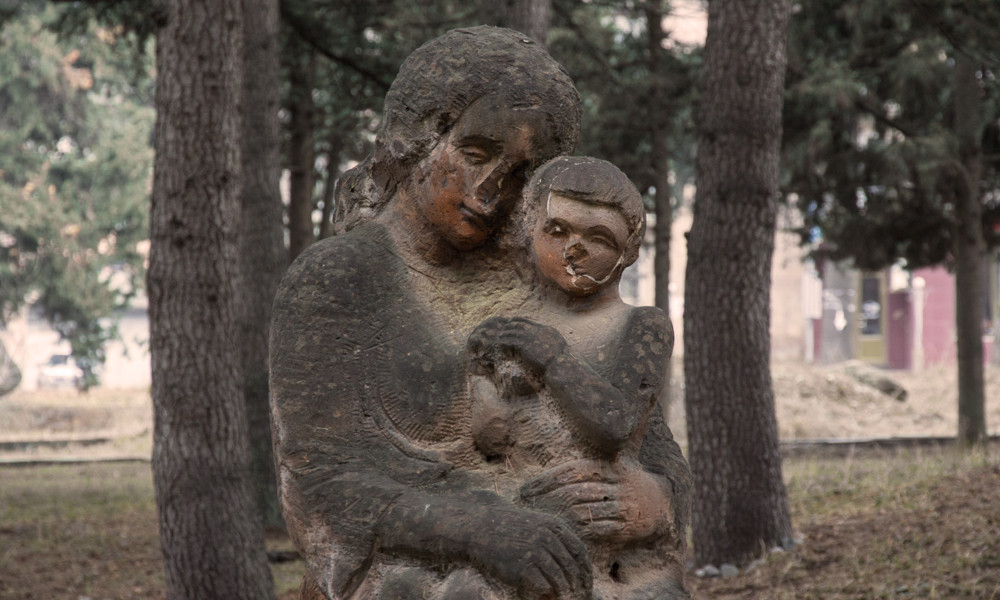The successful collaboration between the "Cultural and Social Narratives Laboratory" (CSN Lab) and the "Ijevan InfoTun" NGO has led to the realisation of the "Sculpture Garden" project.
The main purpose of the "Sculpture Garden" is to support the preservation and development of Ijevan’s cultural identity, urban and natural environments, public spaces, and memory sites. The initiation and implementation of this undertaking, in collaboration with our partners from the Tavush region, marked the beginning of the expansive and multifaceted "Memory Garden: International Memory Festival" endeavour.
While emerging from the “International Sculpture Symposium” in 1985, the “Sculpture Garden” stands as a unique monument in the history of independent Armenia, marking a pivotal phase in the evolution of Ijevan's urban environment.
 In a framework of this uniquely international cultural event, sculptors from around the world, including Georgia, Azerbaijan, Latvia, Lithuania, Russia, Israel, the USA, and beyond, spent months and months creating sculptures within Ijevan city, particularly in the garden along the Aghstev River. Until 1991, the symposium had an annual essence; however, things have drastically changed following several historical turning points such as the Spitak earthquake, the collapse of the Soviet Union, the Karabakh movement, the war, and the post-war crisis.
In a framework of this uniquely international cultural event, sculptors from around the world, including Georgia, Azerbaijan, Latvia, Lithuania, Russia, Israel, the USA, and beyond, spent months and months creating sculptures within Ijevan city, particularly in the garden along the Aghstev River. Until 1991, the symposium had an annual essence; however, things have drastically changed following several historical turning points such as the Spitak earthquake, the collapse of the Soviet Union, the Karabakh movement, the war, and the post-war crisis.
Despite the harsh consequences of hardships and crises, the International “International Sculpture Symposium” left an unforgettably positive impact on Ijevan, and is still being regarded as one of the most significant and memorable events that ever happened in the city. The fate and perception of the “Sculpture Garden” is pretty much alike; amidst challenges such as the growing gentrification, illegal construction, deforestation and pollution of the Aghstev River, it remains steadfast as the core of Ijevan’s urban fabric. Unfortunately, over the course of the last few decades, the ethnic conflicts, wars and militarised narratives resulted in damage and/or demolishment of some sculptures in the garden, yet the city still cherishes the memory of a cultural celebration which used to unite people a long time ago.
Together with our local partners and Ijevan’s community, the CSN Lab has been engaged in conceptualising and implementing a project focused on urban memory of the. The multiple components of the project, which touch upon the topics related to memory, environment and identity, are interconnected and complement each other.
In the first phase of the project, a workshop focused on the methodology of researching the memory of urban environments and identity was conducted. The aim was to establish an alternative educational environment for the local community, particularly the youth. The participants were given the opportunity to look at the environment they live and belong to through different lenses and perspectives. During the workshop, the team members of the CSN Lab shared their extensive research experience of implementing research-based memory projects, as well as tools and skills developed and mastered over the years.
With a shared objective of exploring the memory of Ijevan's urban environment, the participants of the workshop conducted in-depth interviews, collected oral stories, examined family and state archival materials, undertook mapping and visualisation of the urban landscape.
In the second phase of the project, the goal was to redefine and reinterpret the significance of Ijevan's “Sculpture Garden”, highlighting its role in the urban environment, addressing issues such as the gentrification of the garden, pollution of the Aghstev River, as well as raising awareness about the challenges related to the preservation of sculptures. To achieve this, the CSN Lab analysed the findings from the first phase and included them in the "Sculpture Garden" web project, which was presented for both the local community of Ijevan and broader circles of the society. The "Sculpture Garden" web project showcases the architectural and urban significance of the garden, emphasising its impact on the urban fabric and everyday practices of Ijevan’s residents, while also exploring the social memory associated with the garden and the spatial identity formed around it.
In fact, both the workshops and the “Sculpture Garden'' project are only the initial steps of a broader project. The CSN Lab aims to ensure the sustainability of the “Sculpture Garden” and has a clear vision of organising an International Memory Festival in Ijevan’s “Sculpture Garden”. This initiative will bring together experts, academics, researchers, activists, artists, and cultural practitioners, as well as invited professionals from Armenia, Georgia, Ukraine, the Baltic countries, and beyond. Participants will have the opportunity to engage in collective reflections, discussions, and other activities aimed at addressing current cultural affairs and exploring potential solutions. The festival will position Ijevan as a regional centre for cultural endeavours, offering the local community opportunities to actively participate in cultural life. It will create possibilities for alternative/non-formal education for young people and students. Finally, it will serve as a space to address current issues, including the ongoing gentrification of the garden, illegal construction, pollution of the Aghstev River, and the challenges in preserving the garden.
 Initiating the festival in Ijevan is a priority for our organisation not only because we support the decentralisation of culture in Armenia, but also because Ijevan serves as a connecting point between the capital cities of Armenia and Georgia, being equidistant from each of them. Another key aspect is the pivotal role of the Aghstev River, which not only flows through Ijevan but also serves as a connecting link between regional and neighbouring countries— Armenia and Azerbaijan. The “Sculpture Garden”, located right next to the Aghstev River, is where we plan to conduct our International Memory Festival.
Initiating the festival in Ijevan is a priority for our organisation not only because we support the decentralisation of culture in Armenia, but also because Ijevan serves as a connecting point between the capital cities of Armenia and Georgia, being equidistant from each of them. Another key aspect is the pivotal role of the Aghstev River, which not only flows through Ijevan but also serves as a connecting link between regional and neighbouring countries— Armenia and Azerbaijan. The “Sculpture Garden”, located right next to the Aghstev River, is where we plan to conduct our International Memory Festival.
This cultural endeavour will focus on memory studies and memory activism, providing an inclusive and open platform to address the memory of a complex past shared by Armenia and other regional countries. The “Sculpture Garden” will not only serve as the main venue of the festival but also be the living symbol of how culture can unite people.
The "Memory Garden: International Memory Festival" project primarily aims to promote discourse on tangible and intangible cultural heritage. As a cultural organisation, the CSN Lab envisions achieving this by first of all decentralising culture and activating cultural life in the regions of Armenia. Our team aims to create a nurturing environment for academics, researchers, artists and cultural practitioners from the region to talk about both challenges and success stories related to the preservation of culture and cultural heritage. The festival will also serve as an opportunity to rethink the Soviet legacy, an integral part of the cultural realities of the region, and has a potential to become a basis for establishing cultural dialogue between different communities at the national, regional, interregional and international levels. The “Memory Garden: International Memory Festival" aspires to turn into an open, diverse, inclusive and accessible occasion and environment where cultural issues and concerns can be raised and discussed, and most importantly— democratic memory can be mainstreamed and appreciated.


